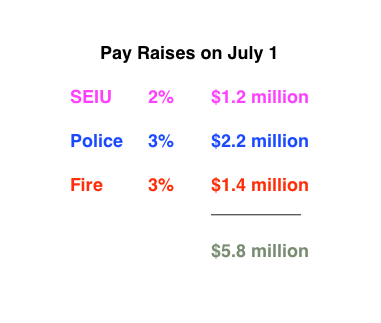
By the Daily Post staff
Palo Alto City Council tonight will hold the first of three evening hearings on cutting as much as $39 million from the city budget, but it’s unknown if council members will discuss the pay raises city employees are getting.
On July 1, three unions are scheduled to receive pay raises that will add $5.8 million to the city budget. Eliminate the raises, and the council’s cuts won’t have to be as deep.
City officials maintain that they can’t cancel the raises because they’re part of contracts that were negotiated last year.
However, the city has the ability to meet with the unions and ask them to give up the raises voluntarily. City leaders can twist some arms and tell the unions that they’ll layoff enough union employees to equal $5.8 million if they don’t give up the raises.
And the city can go to the California Public Employment Relations Board, which arbitrates disputes between cities and unions, and ask if the state of emergency council imposed in March allows them to cancel raises.
So far, council members appear afraid to even discuss the union pay raise issue. Alison Cormack didn’t touch the subject in a 964-word Palo Alto Weekly op-ed earlier this month. Lydia Kou sent an online survey to residents on Saturday that didn’t broach the topic of the union pay raises. At previous hearings on the budget, council members have steered clear of the raises.
The raises come at a time when unemployment has hit 14.7%, the highest since the Great Depression in the 1930s. The Labor Department said on Friday that 20.5 million jobs vanished in April.
The $5.8 million in raises aren’t on tonight’s agenda (Item 10) but City Manager Ed Shikada has proposed an alternative that would eliminate 91 full-time positions and 33 part-time jobs. That doesn’t necessarily mean the city would layoff 91 full-time employees and 33 part-timers, however. Under the city’s various union contracts, employees facing layoffs have “bumping rights” that allow them to take vacant positions if qualified.
Other cuts that are on the table include traffic enforcement, animal control and reducing the hours that the police lobby is open.
Shikada said the city will also explore reducing firefighters and charge a fee for medical response services.
The Children’s library and Riconada library could have hours reduced, the College Terrace Library could be shutdown and the Embarcadero and Crosstown shuttle services might be shut down. City positions in departments
including human services and administration might be cut.
Possible budget cuts have already stirred concern in the community. Some of the changes could be a problem for Palo Alto’s schools.
On Tuesday (May 12), the school board will discuss those proposed cuts for teen programs and crossing guards. Palo Alto might stop renting the Cubberley Community Center from the school district which would mean a $5 million loss to the schools. Dozens of residents on Facebook said they are upset that the city might close College Terrace Library at 2300 Wellesley Street for two years.
Kevin Murray told the Post that he grew up going to the library and used it through high school and while attending Foothills College. He said it could operate with more volunteers instead of paid workers to save money.
Members of council said they are not excited about the decisions they will be making this week.
Councilwoman Liz Kniss said it will be a really unpleasant week and Councilwoman Alison Cormack said it will be hard for everyone.
Mayor Adrian Fine said that given the amount council needs to cut, everything will be considered. He said people shouldn’t expect to preserve anything.
The city’s pensions will also be a worse issue in years to come.
Shikada said the city’s pension investments are expecting 4-5% losses this year because of the economic downturn.
The city expects to lose $20 million by the time this fiscal year ends in June because of a drop in sales and hotel tax revenue, less permit revenue and increased spending on responding to COVID-19.




No, they’re not going to mention the raises because they’re not going to stop them. This is one where they think that if they don’t mention it, people will forget about it this fall when Kou, Tanaka and Fine are running for re-election. They’ll say things like: Our hands were tied. I didn’t want to give those raises, but I had no choice. It was a council decision. I’m just one vote on a seven-member council, so don’t hold me responsible for anything.
Cut labor costs. Now.
Poor Tanaka noticed there are 112 budgeted vacant positions. “Ah, savings!” He then got a bunch of double talk about why not filling the vacancies wouldn’t save any money.
He then tried to get a list of positions serving residents vs administrative like pr and communications. No can do, he was told. Everyone benefits from pr and communications so don’t look at that $1,000,000.
Well, let’s focus on managers vs workers. Oh, you can’t really identify managers even though their title is manageer because they might be managing 8 vendors.
Fascinating and disheartening watching this but good for Tanaka for trying to get them to identify waste to be cut/
The reason why they’re leaving those vacant positions open is that when they begin laying off people, those who are laid off will use their “bumping” rights to take the jobs of others who have less seniority. The workers who were bumped will then grab the vacant positions. Nobody will lose their jobs. That’s how it works in city government. Sounds like Tanaka didn’t understand the process. They keep the vacancies open to create “rescue jobs” so that nobody is shoved out the door.
If the unions get raises at a time like this we need a council RECALL!